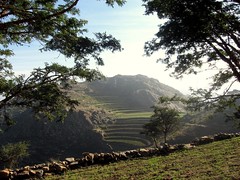This scandal has been reported on several websites:
The sharp images from Google Earth clearly shows the North Korean communist dictatorship is logging forest areas in a UN national park. Not only does the megalomaniac Kim Jong-il seek to build a nuclear armament, impoverish his subdued people and occasionally sink South Korean ships – he's also cutting down trees in the fragile, ancient forest where the last Siberian tigers live.
International researchers have long been monitoring the NASA satellite images of the area since they are not allowed to inspect it on ground. They were wondering why the green color of the forest was fading to brownish. But the precise satellite images from Google Earth now shows why: The North Koreans have been secretly logging in strips no wider than 10 meters – too slim to stand out on the old NASA images.
“I have applied for a permit to visit the area but have been denied access”, says scientist Lina Tang.
Or maybe not. The above text is typical but it's not really a quote. It has been further dramatized in order to illustrate the symptomatic: There are two “good stories” in the recent academic research published in Biological Conservation. One is in the tale of the reckless North Koreans. The other in the coolness of Google.
Wait a second – what are we talking about?
Forest areas surrounding a mountain on the border between North Korea and China. The Koreans call the mountain
Baekdu-san, the Chinese call it
Changbaishan and
Wikipedia calls it Baekdu Mountain. At it's peak is a picturesque lake – sacred to some, probably tourist attraction to more – called Heaven Lake. Down its slope the climate changes from freezing tundra to temperate forest. It is home to many plants and animals; including the endangered Siberian tiger and wild ginseng.
So, what did the article by Lina Tang and the eight co-authors really say? Below is a summary.
Forest degradation deepens around and within protected areas in East Asia
It is true that the NASA Landsat images didn't show the finer details. But they do show a story going back to 1985. The methods chapter is interesting for people into geeky stuff about image analysis. It is indeed also true that the forests have suffered degradation on both sides of the border.
The
Changbaishan and
Baekdu-san were established as UNESCO Biosphere Reserves in 1979 and 1989 respectively to protect the ecosystem there which is home to the highest plant biodiversity in the cool temperate zone and – as mentioned – many endangered species. But there are many differences in the way the forests have been managed and much more is known about the Chinese parts.
The Chinese government has successfully enforced a ban on logging but areas has been severely damaged by storms and are still recovering. From 1985 to 2007 about 6% of the forest was lost. On the other hand, poaching has occurred and wild ginseng has been collected into obscurity. Right outside the reserve the Chinese have extensively logged the pine forest, doing some reforestation with birch and aspen.
On the Korean side about half the reserve area had suffered strip logging by 2007. This was clear only recently as the strips are about 10 meters wide, whereas in the older satellite images each pixel cover about 30 meters. The Koreans have cleared about 39% of the forest outside the reserve for agriculture.
Another thing the older satellite images didn't reveal was seed collecting and tourism. From the year 2000 to 2007 it was allowed to gather pine seeds in the Chinese reserve, a cherished food ingredient and valuable source of income for locals. In those years very few seeds were left to enter the natural cycle (animal food source and natural reforestation) and today nearly every tree bears wounds from climbing spurs. Also, in 2006 administration was moved from the Forestry Bureau to the Tourism Bureau. The number of visitors has rocketed from about 30,000 per year in the 1980ies to as much as 10,000 a day now. Much less is known about how the Koreans administrate the reserve but they do allow tourism.
The researchers estimate the “truly well-protected” reserve forest areas to be 44.9% in China and 34.6% in Korea. But these areas are ecologically isolated due to the extensive deforestation of the areas surrounding the reserves.
Second thoughts
Before raising an environmentalist call t
o relieve Kim Jong-il of his duties let us consider the following: The North Koreans are probably at least as effective as the Chinese in banning illegal logging, the Chinese side has suffered similar levels of deforestation and unfortunately this situation isn't exactly unique.
We're having problems with ecological isolation, illegal logging, poaching, severe weather events, climate change in many places around the world. The difference is in how to influence the leader(s) of this country – a problem similar to what we see in places like Zimbabwe.
Writing about development we are encouraged to not portray the third world as the victims of the story. Norht Korea, however, despite its few glimmers of progress and success is a unique tragedy. One with the bomb.
This story elsewhere: Treehugger / North Korea Logging in Protected Forest Discovered With Google, NASA Data, Mongabay / NASA, Google Earth catch North Korea logging protected area, UPI / Study: North Korea logs in protected area.
The Primary source is, of course:
 Tang, L., Shao, G., Piao, Z., Dai, L., Jenkins, M., Wang, S., Wu, G., Wu, J., & Zhao, J. (2010). Forest degradation deepens around and within protected areas in East Asia Biological Conservation, 143 (5), 1295-1298 DOI: 10.1016/j.biocon.2010.01.024
This article is also posted at TH!NK ABOUT IT #3: Developing World.
Tang, L., Shao, G., Piao, Z., Dai, L., Jenkins, M., Wang, S., Wu, G., Wu, J., & Zhao, J. (2010). Forest degradation deepens around and within protected areas in East Asia Biological Conservation, 143 (5), 1295-1298 DOI: 10.1016/j.biocon.2010.01.024
This article is also posted at TH!NK ABOUT IT #3: Developing World.

